We’ve all been there. With dozens of tutorials read and a bunch of courses passed, you’re still in the starting point. You must make a first step but which exactly? So how do you start monetizing? This time, Favorable Uwitonze, who joined Adsterra as a publisher not so long ago, has come at your rescue. He’s about to list several vital steps to a successful monetization while sharing basic yet crucial SEO tips.

Favorable Uwitonze, webmaster and blogger
Hello! My name is Favorable UWITONZE from Rwanda, I’m really happy to share with you my testimony about how I found a side earning.
I have a regular job as a night guard at a local school in my area, but my job couldn’t help me to satisfy all my family’s needs because I get paid some little money.
I had no skills in investing or selling, but learned about making money online using such systems like AdSense from Google and Adsterra. I’m skilled as a journalist, so I decided to try writing and posting news on the web to earn from my website visitors.
Here below is my story where I share how to start monetizing if you’re a newbie and don’t even have a website.
Take a shortcut and choose the right platform
You can’t begin monetizing a website without having at least an outline of the strategy. Many bloggers will spend months trying all means of earning at the same moment. And that leads to a complete confusion. I have worked out 5 main tips for choosing a service or system for making cash on the web.
1. Look for every opportunity to earn and focus on it
I started monetizing with Adsterra without a website. As I had got many declines by AdSense I thought Adsterra would not approve my blog, as well. I was wrong, actually 😉
So, with Adsterra I earned $2.00 for the first day just by sharing Direct Link and using Facebook traffic. I felt very happy because it was an additional income.
I kept sharing the Direct Link but was too pushy in my activities, and got a warning from Facebook. So I decided to try website monetization.
2. If you fail with one platform, try the alternatives
As I could understand, Google AdSense can sometimes decline your website if its content is in a local dialect (like mine). After ten or more tries to get an approval I gave up. But that was the right decision because it forced me to move further. And as my friend recommended Adsterra, I didn’t hesitate.
My traffic was enough for Adsterra (you don’t need to send 1 million views daily). My content was ok, too. So I started monetizing the same day I got registered.
3. Make sure ads look nice and friendly
I’m not a web designer but I can relate to anyone who finds big flashy banners annoying. With Adsterra, I can choose between multiple ads, replacing those that my readers don’t like.
This picture shows how the In-Page Push Notification (or Social Bar) ad looks like in my story. It’s just nice.
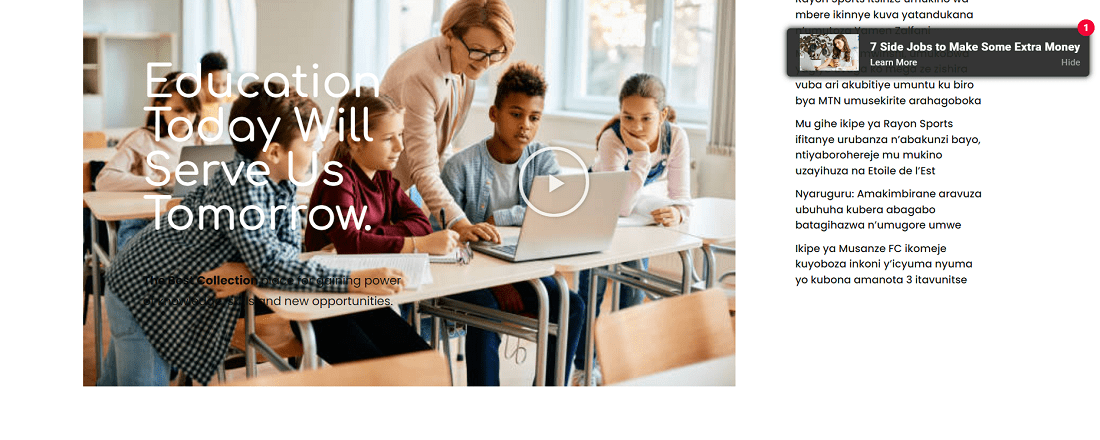
I use Native Banners, too. In my account, I set up how many banners I need per ad space. I chose one, so my website doesn’t look oversaturated with ads.
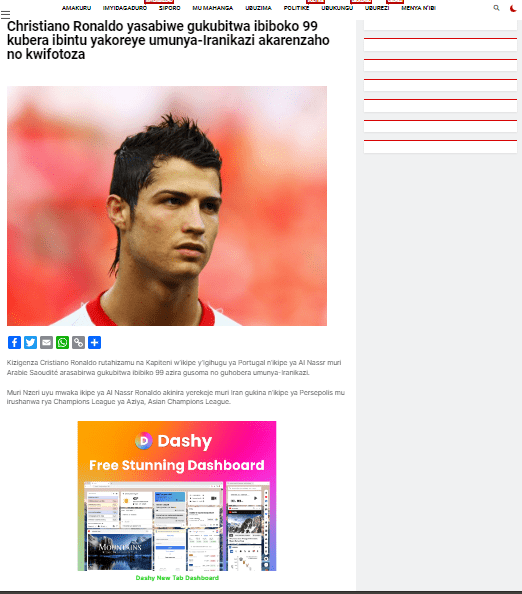
4. Ensure your platform counts impressions fairly
This life hack is not taken from my personal experience, but my friend told me some ad networks may column fewer impressions than you actually send them. And this means, your CPM and revenue level will be lower. Thankfully, Adsterra counts all impressions properly.
5. Check the payment hold and a threshold
A payment hold is a frequency of payments. In other words, how often you get paid. Adsterra pays after 15 days with a low threshold while AdSense pays after 30 days with a high threshold of $100. A payment threshold is also called a minimum payout, and on Adsterra it can vary depending on the payment method. With some of them like Paxum, you get paid while you hit only $5 on the account.
6. It’s important to have live support
same thing with monetization. It happens when something goes wrong, like when you place ads ignoring the instructions or when you need to get rid of unwanted advertising types. If you wait for hours or even days, you can lose traffic.
My advice is to check if your platform offers 24/7 support. It might not seem important but it’s only until the first breakdown happens.
7. Look for additional opportunities to earn
I mentioned earlier that I started monetizing with a Direct Link. It’s not a typical ad but a simple link you can place anywhere where you have lots of traffic. I don’t recommend adding it directly to your Facebook profile since FB does not support such promotional links. At the same time, you can send Facebook traffic to a one-page website with a Direct Link.
Another additional opportunity for beginners is the Referral program. Look for such programs in your ad network. It’s more like a system of recommendations when you invite your friend to join an ad network and give them a unique link. The ad network will recognize your referral by this link and pay you extra money.
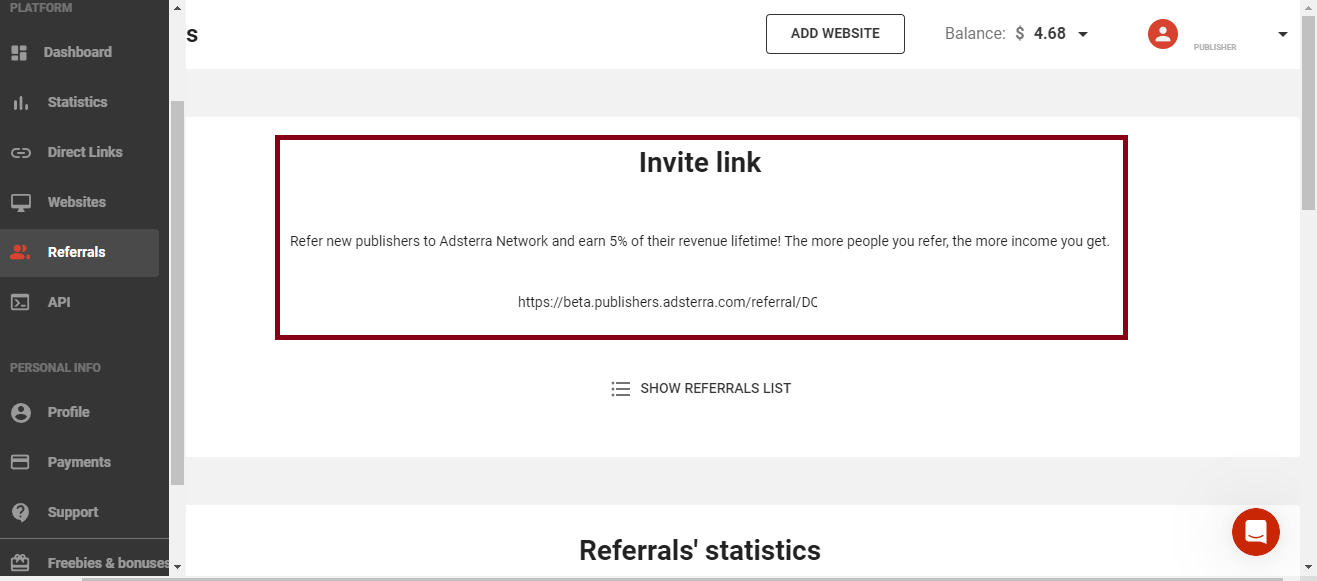
I’m really happy because my dreams have come true since I received my first payment from Adsterra, and my payment proof is shown on the screenshot below.
I am on the road to increase my revenue as I always study and know the way that can help me to get higher profits.

I have grown my website audience very fast, and that was the main factor of a successful monetization start. With zero views in the beginning, I had 2 to 14K daily views after five months only. This was not easy because it required me to work hard and to have some tactics which I really recommend other bloggers apply in order to generate traffic. Here they are:
Do basic SEO and hit 6K view daily
One will say “a newbie can’t get high in search results”. I say “If I could, you can do it too.” I recently hit 6K views daily, and that’s more than enough to start monetizing!
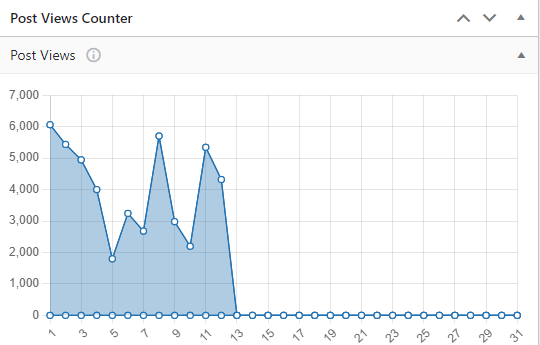
Ok, so what I recommend doing if you’re a beginner blogger:
Grab the right niche and stand out from the crowd
As a journalist, I know that the story of a writer is like the art of an artist. You write about something happening around but add your unique tone and point of view.
I always write about topics that captivate me. I post content about celebrities, entertainment, sports and some local news trends on social media.
What makes my blog stand out? I have a narrow focus: lots of posts relate to local celebrities and events. And many young people from where I live are eager to learn more about local stars, news, and events.
Pick an SEO-friendly website name (domain)
Want to know the best hack ever? If there’s an unoccupied domain in your niche, grab it! I’m running a blog about news in my region in Rwanda. And what I did first, is checked for free domain “.com” names. Luckily, my region name was not taken. So I simply named my website like this!
If you write about your city, country, or region, check if the domain “yourcity.com” is free, and if so, you can buy it! But remember: an SEO-friendly, popular domain doesn’t provide success. You still have to create content that overcomes competitors’ posts.
Install good plugins
The instruments that I use to improve my SEO are Yoast SEO and Rank Math SEO. I chose them since I knew them from my friend and I immediately installed them on my website because they are free and they combine the features of many SEO tools.
But I advise the new bloggers to carefully read reviews left by users and developer’s documentation before installing any plugin. Not every tool, especially a free one, works properly. Moreover, thay may contain bugs that can break your website security.
The main purposes to use plugins are:
- Improve website loading speed
- Check keyword density
- Add or replace keywords
- Improve dwell time
- Optimize old content for a new user intent, and so on
Buy a credible domain name
Needless to say that your content must look credible. If you own a “mysite.blogspot.com” blog, it’s ok, but some people may think you’re not a mature or expert writer.
I prefer paying little money for a unique domain name ending with “.com”. If you’re on a self-hosted platform like WordPress, you can purchase a domain right via the platform’s services.
Alternative domain name providers are: Namecheap, Dreamhost, GreenGeeks, Bluehost, and many others.
Do keyword research in 5 minutes!
Beginners usually either ignore keyword research, or spend days on finding the best ones. I believe you should start with a simple but effective set of steps. It will help you create a post that is easy to find in Google.
1. Outline your target audience
Who are you writing for? What’s their location? What are their interests?
2. Specify a seed keyword
t’s the main keyword that tells you about a niche or industry you’re writing about. It should be broad. For example, “paddle boarding” or “affiliate marketing.”
3. Use keyword research tools to generate a topic for your post
It’s time to add related keywords and turn the initial seed phrase into a blog post topic. To begin with, you can use Mangool’s trial version (10 days) or any other system.
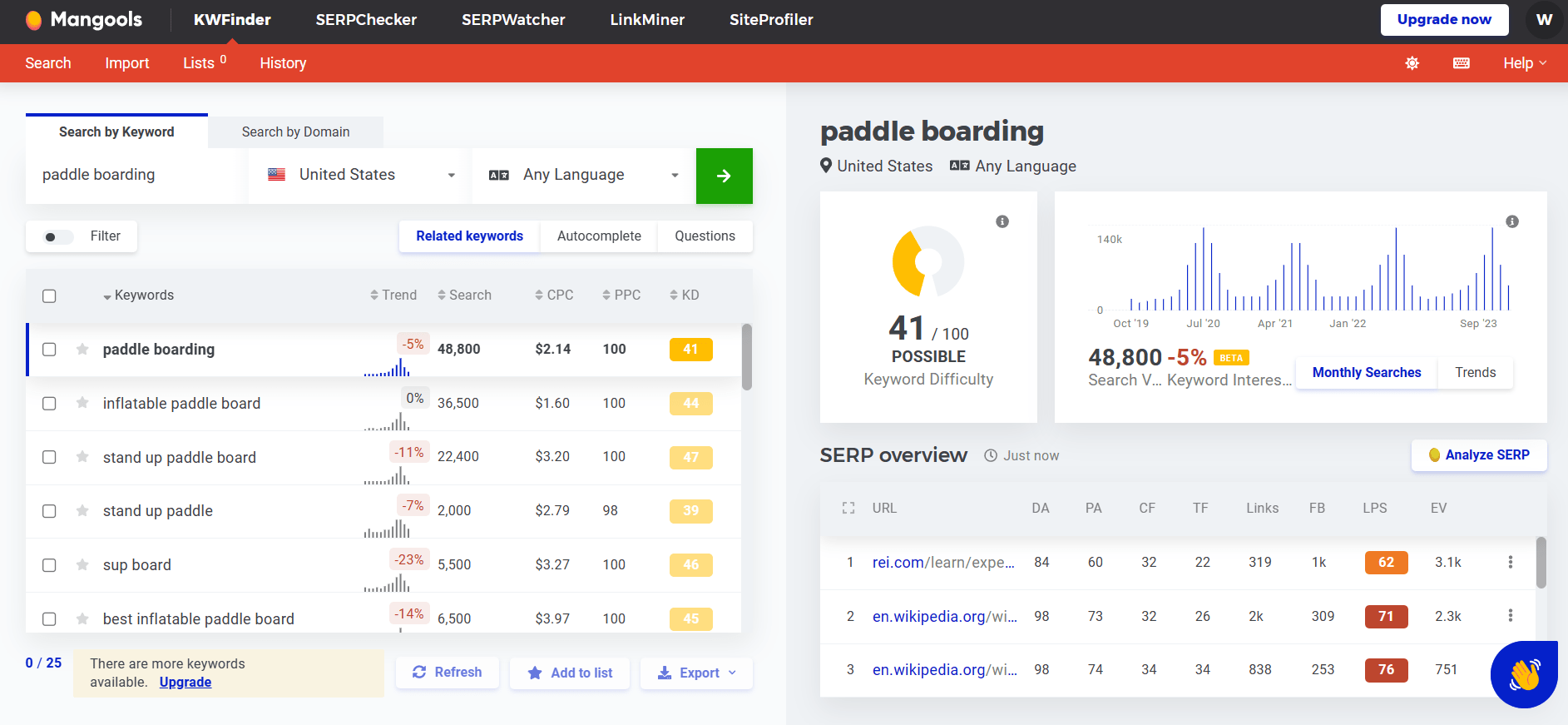
I advise you to take a look at the Questions page. It shows what people ask Google about your topic.
4. Prioritize keywords
Beginners will face a rough competition if they choose high-volume and high-competition words. But targeting low-volume keywords is also a bad strategy. So my point is to select those phrases that are somewhere in the middle.
5. Check your content with Yoast or other plugin
After you finish your writing having added all the keywords, check the content with a special tool like Yoast. It will estimate if you added enough keywords, whether your writing is readable and easy-to-understand, and if you need to break longer chapters into shorter and simpler ones.
6. Share your content in social media
When you know your niche, you need to also know where your audience is. My local news are very popular in Facebook communities of Rwanda, but I have to rewrite the headlines and sometimes even upload new images to make every post suitable for the platform. It takes time, so it’s not just reposting your blog content. But it’s worth doing. Facebook visitors coming to my website are very loyal readers. They even subscribe to updates.
To finish this set of tips, I must add the final advice, which is “create quality content.” Copy-pasting other authors’ blog posts is a bad strategy, as well as poor SEO. But these are not the only mistakes a blogger can make. How about listing some more of them?
Avoid these mistakes when you start monetizing
There are some most frequent mistakes made by bloggers while starting and I tried to combat them. Among them, I can list:
No target audience
Many bloggers start without knowing where the readers will come from and how they can find them. They aim for very competitive niches like Health and Beauty but can’t create something outstanding. They stay in their 50 to 100 position in search results not having enough traffic. This is the mistake that makes many bloggers work hard but not get views.
Before you start monetizing a website or social media account, make sure there are enough users interested in your content, and the niche you picked is not over-occupied, or you really can create unique content for a very competitive niche.
Too many traffic sources at the same time
Newcomers like using many platforms as traffic sources, thinking that it is a good way to get many views but it is not always true.
When you don’t have enough time to develop all of your accounts in social networks or forums, you just waste time. For example, you can use Facebook only as a traffic source and you get a lot more views than anyone who uses Instagram, X (Twitter), Pinterest, Facebook, WhatsApp, Qoura, Reddit, and so on. As for me, I use only one Facebook page and it satisfies me when I work regularly.
Not having a custom domain using unreliable free hosting
This is not good for bloggers especially for those who are starting because your blog is difficult to be found by anyone who tries to search it. When your blog is not self-hosted, there are some accesses that you are not allowed to have like themes, plugins and so on.
Blogs placed on free subdomains may not be accepted by some ad networks. It’s like an email ending with @gmail or @hotmail. They don’t seem credible. Adsterra supports algorithms to verify such websites and accept subdomains of Blogger and WordPress, but many other networks will simply refuse dealing with you.
It is not professional to use domain names like blogspot.com, wordpress.com, pantheonsite.io… which are all free. So, I advise the new blogger to purchase a memorable and brandable custom domain name which will help their business to stand out and grow in popularity.
Free hosting is another trap: if it’s provided by a little-known platform, you can lose all your content in seconds or get banned without explanations. So it’s better to host your blog on WP, Blogger or other giant platforms or think of a self-hosted blog.
Having no niche
It’s really difficult to attract people to subscribe to your blog if you don’t have a niche. If you don’t have a clear niche, it will be hard to attract people to read or sell (marketing) through what you write. I advise that bloggers have a clear niche precisely because if they don’t do so, what they build will not last for a long time.
Ignoring social media
Many new bloggers believe that creating a good quality of content can bring readers. That is true but it’s not enough if you don’t use any social media.
Depending on your niche, social media can be a good traffic source where you can attract a large number of target readers. But be cautious and don’t rush to develop multiple social accounts at the same time. As I said above, you will get distracted by these multiple platforms and end up with nothing.
Copying and pasting content from other blogs
For many bloggers including me, starting out is a hard process when you need to write a lot but your creativity fails you. Don’t give up and never copy others’ posts. It is totally unprofessional, and it does not score well in search engine results. Ad networks will usually detect plagiarized content fast, too. One more thing to add: you will not learn to be a pro blogger if you don’t train writing skills and creativity.
Not looking for monetization alternatives
The biggest mistake I made was in trying to meet AdSense’s terms for too long. It’s a big and notable system for bloggers, but sometimes you can’t get verified here. I was applying for approval several times during seven months, but didn’t succeed. Although I had a lot of visitors by that time, it didn’t help me. Imagine how surprised I was when I got verified in a minute by Adsterra.
To conclude my story, I can only say that life is a struggle, and I need to learn more to get higher revenues. I’m on my way to entering the English-speaking markets and generating more traffic from these countries.
![[Success Story] How to Start Monetizing if You’re not Skilled in Making Money?](https://blogdev.adsterratech.com/blog/wp-content/uploads/2024/01/how-to-start-monetizing-blogcover-780x364.png)